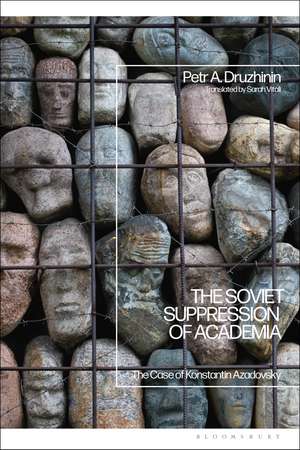The Soviet Suppression of Academia: The Case of Konstantin Azadovsky
Autor Petr A. Druzhinin Traducere de Sarah Vitalien Limba Engleză Paperback – 24 ian 2024
| Toate formatele și edițiile | Preț | Express |
|---|---|---|
| Paperback (1) | 192.36 lei 6-8 săpt. | |
| Bloomsbury Publishing – 24 ian 2024 | 192.36 lei 6-8 săpt. | |
| Hardback (1) | 540.65 lei 6-8 săpt. | +116.05 lei 10-14 zile |
| Bloomsbury Publishing – 27 iul 2022 | 540.65 lei 6-8 săpt. | +116.05 lei 10-14 zile |
Preț: 192.36 lei
Preț vechi: 249.92 lei
-23% Nou
Puncte Express: 289
Preț estimativ în valută:
36.81€ • 38.53$ • 30.46£
36.81€ • 38.53$ • 30.46£
Carte tipărită la comandă
Livrare economică 05-19 aprilie
Preluare comenzi: 021 569.72.76
Specificații
ISBN-13: 9781350333208
ISBN-10: 1350333204
Pagini: 280
Ilustrații: 15 bw illus
Dimensiuni: 156 x 234 x 25 mm
Greutate: 0.39 kg
Editura: Bloomsbury Publishing
Colecția Bloomsbury Academic
Locul publicării:London, United Kingdom
ISBN-10: 1350333204
Pagini: 280
Ilustrații: 15 bw illus
Dimensiuni: 156 x 234 x 25 mm
Greutate: 0.39 kg
Editura: Bloomsbury Publishing
Colecția Bloomsbury Academic
Locul publicării:London, United Kingdom
Caracteristici
Uses archival sources, including the archives of the Soviet and post-Soviet Security Service, which have not been made public before
Notă biografică
Petr A. Druzhinin is a Russian-Israeli historian and a fellow at Tel Aviv University, Israel, and the at the Russian Language Institute of the Russian Academy of Sciences, Russia. He is the author of Frederik the Great's Books (2004) and Heraldry and Rare Books (2014).Sarah Vitali is Affiliated Lecturer at the University of Cambridge, UK. Her published translations include Vladislav Khodasevich's Necropolis (Columbia University Press, 2019). She is also the translation editor of the New York-based arts and literary magazine American Chordata.
Cuprins
List of IllustrationsIntroduction1. Intellectual Life in Leningrad in the Late Soviet Period2. Suppressing Nonconformism in the USSR's 'Second Capital'3. The Dynamics of the Power-Culture Relationship4. Constructing an 'Internal Enemy'5. Nonconformism on Trial6. Prison Life in the Late Soviet Union7. The Discursive Deconstruction of the Soviet Regime and its Limits during Perestroika8. Continuity and Change: Struggling for Rehabilitation in Post-Soviet RussaConclusionBibliographyIndex
Recenzii
As too many in modern Russia are also discovering, repression has a momentum of its own. Petr Druzhinin's meticulous exploration of the case of the Azadovskys follows this dark path through forty years of Russian history through to the post-Soviet 1990s.
This fascinating account of the ordeal suffered by Konstantin Azadovsky, an eminent literary scholar, in the 1980s is a reminder of the cruelty and arbitrariness of the Soviet Communist regime. Anyone today who feels nostalgic about the Soviet era ought to read this book. Azadovsky was a cautious person, but that did not prevent him from being targeted by the Soviet KGB, which orchestrated his arrest and imprisonment on trumped-up charges. Like Joseph K. in Kafka's The Trial, Azadovsky was thrust into a faceless bureaucratic morass and punished for crimes he did not commit. Petr Druzhinin recounts this appalling episode in vivid detail, showing how the Soviet repressive apparatus enforced the whims of an odious dictatorship. Much has changed in Russia since the 1980s, but unfortunately the travails Azadovsky experienced four decades ago are disturbingly reminiscent of the way opposition figures nowadays in Russia have been repressed under Vladimir Putin's autocratic rule.
This book provides a close-up view of what it was like to live under continuous KGB surveillance and repression, and sheds new light on the tenuous relationship between the state and intellectuals during the Soviet period.
This fascinating account of the ordeal suffered by Konstantin Azadovsky, an eminent literary scholar, in the 1980s is a reminder of the cruelty and arbitrariness of the Soviet Communist regime. Anyone today who feels nostalgic about the Soviet era ought to read this book. Azadovsky was a cautious person, but that did not prevent him from being targeted by the Soviet KGB, which orchestrated his arrest and imprisonment on trumped-up charges. Like Joseph K. in Kafka's The Trial, Azadovsky was thrust into a faceless bureaucratic morass and punished for crimes he did not commit. Petr Druzhinin recounts this appalling episode in vivid detail, showing how the Soviet repressive apparatus enforced the whims of an odious dictatorship. Much has changed in Russia since the 1980s, but unfortunately the travails Azadovsky experienced four decades ago are disturbingly reminiscent of the way opposition figures nowadays in Russia have been repressed under Vladimir Putin's autocratic rule.
This book provides a close-up view of what it was like to live under continuous KGB surveillance and repression, and sheds new light on the tenuous relationship between the state and intellectuals during the Soviet period.
